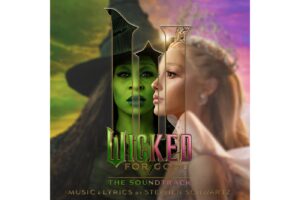Music Review: ‘Wicked: For Good – The Soundtrack’ raises the stakes
By Canadian Press on November 21, 2025.
Are you ready for more “Wicked”? “Wicked: For Good — The Soundtrack” offers a bulked-up take on the music of the original “Wicked” musical’s second act, grounded in
yet-again stellar vocals from
Cynthia Erivo as a misunderstood but defiant Elphaba and
Ariana Grande as a conflicted but changing Glinda. New songs and lyrics raise the stakes — even if the music itself is at times weighed down by the plot it helps move along,
like the film it accompanies.
The soundtrack opens with “Every Day More Wicked,” a lengthened-version of a section of the original Act 2 opener “Thank Goodness” with new verses about Elphaba’s perceived wickedness and Glinda’s presumed goodness set to bold orchestration that matches the first film’s opening number, “No One Mourns the Wicked.” Drum beats and ensemble singers are the world builders here, twisting the melody into a march.
The album’s first solo goes to
Michelle Yeoh’s Madame Morrible, the sorceress at the center of a propaganda campaign against Elphaba — a choice that works for the plot, but which offsets the power of Erivo and Grande’s forthcoming vocals. They are introduced later, through brief interpolations of the Act 1 showstoppers “The Wizard and I” and “Popular.” All of that makes for a dynamic film opener — but is more fractured in audio form, sans the sumptuous visuals and character reveals that tie those musical references together on screen.
Fortunately, “Thank Goodness / I Couldn’t Be Happier” quickly follows, bringing Grande center-stage — and providing a rare-here opportunity for her soprano head-voice to give way to a deeper belt (her passionate tone, like other Glindas before her, turns this almost nonsensical lyric, “There are bridges you cross you didn’t know you crossed until you’ve crossed them,” into a revelation). That’s not the last we hear from this capital “G” Good, Glinda. “Wonderful,” usually a duet between Elphaba and the Wizard of Oz, is ‘Galinda-fied,’ with Grande adding welcome harmonies — and a brief “Defying Gravity” interlude — to
Jeff Goldblum’s Wizard romp.
It was always going to be hard for this album to live up to the soundtrack of the first “Wicked,” which ended with Erivo’s take on the iconic “Defying Gravity” battle cry, and saw Grande own the over-the-top glitz of “Popular.” But that grandness is replicated in key moments: In Grande’s operatic soprano, in Erivo and
Jonathan Bailey’s sensual “As Long As You’re Mine,” in which Bailey as Fiyero manages to keep up with Erivo’s beckoning vocals, and in “No Good Deed,” the album’s sonic peak.
At 44 minutes and 52 seconds, the soundtrack adds over 15 minutes of music to the runtime of the original Broadway cast recording’s second act. That includes two brand new songs written for the film (making them eligible for Oscar consideration), one for Erivo’s Elphaba and one for Grande’s Glinda. In lengthening the shorter second act into a 2 hour and 17 minute long film, director Jon M. Chu stretches some of these songs across scenes, filling them out with dialogue, additional verses from composer and lyricist Stephen Schwartz and additional scoring from composer John Powell. All of that is a double-edged sword (broom? wand?), at times deflating the power of the tight original tracks, at others adding felt emotional stakes ripe for satisfying listening.
For example: Some of the drama of Marissa Bode, Ethan Slater and Erivo’s “Wicked Witch of the East,” a song performed on Broadway that was also left off the original cast recording, is weakened by which pieces of the interspersed dialogue remain, and which don’t, in the soundtrack version of the song. Like the Tin Man, it feels a bit piecemeal.
But the new tracks are highlights, fleshing out the album. Erivo’s “No Place Like Home” pulls on the iconic line said by Dorothy in “The Wizard of Oz,” providing this Oz-inspired show its take on the theme, like another Oz-inspired show, “The Wiz,” found before. (“Home,” that show’s nod to the line, was sung by Erivo at this year’s Oscars ceremony). The song is the most inherently political, a timely tale of borders, defiance and community. It starts with Erivo’s voice almost isolated, strings swelling behind her, and ends with the first of her transcendent vocal runs, restored to a full open note (after being cut short by the Cowardly Lion on screen) in the album.
That power is felt tenfold in Erivo’s take on “No Good Deed.” The film may belong to Glinda’s emotional trajectory, but it is Erivo who steals the soundtrack’s climax. Drums return as the agony heard in her voice intensifies, the strings crescendoing with her final call.
Glinda’s emotional journey may at first be more subtle, but Grande portrays it deftly. Airy and introspective, “Girl in the Bubble” serves as turning point, filling in gaps about Glinda’s internal reckoning. Her voice is restrained but emotional, Schwartz’s lyrics straightforward with a cheese that feels earned, and thus earnest. This is Glinda after all, not Grande.
Both songs boost the emotional payoff of the character’s finale duet, the fan-beloved tear-jerker “For Good.” And it’s no surprise, years into their own journey with the characters, that Erivo and Grande nail the chemistry of their character’s friendship.
___
“Wicked: For Good — The Soundtrack”
Three and a half stars out of five.
On repeat: “No Good Deed,” “Thank Goodness,” “For Good”
Skip it: “Every Day More Wicked,” “Wicked Witch of the East”
For fans of: Well, “Wicked,” musical theater ballads, chill-inducing vocals
Elise Ryan, The Associated Press
21
-20



